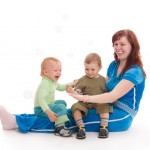
We have posted elsewhere on the site about the issue of support for parents with learning disabilities and the differences in perspective that exist between parents with disabilities and the professionals who support them.
The authors of this study looked at the need for accurate planning data to support the development of support services. The authors looked at the 5-year incidence of children born to women with learning disabilities in a county in Sweden.
They identified women born between 1975 and 1989 from school registers for children and adolescents with learning disabilities in the county of Blekinge and linked identification numbers with the Swedish Medical Birth Register.
They found 98 women with learning disabilities, none of whom had given birth to children; one woman to two children and eight women to one child each. The 10 children were born between 2004 and 2008.
They concluded that the incidence rate calculated indicated approximately 2.12 per 1000 children are born per year to women with learning disabilities. For a country the size of Sweden (approx 9 million) this indicated an incidence of approximately 225 children each year.
The authors suggest that on this basis, the prevalence of children (aged 0–18 years) being born to women with learning disabilities is estimated at about 4050.
Children born to women with intellectual disabilities – 5-year incidence in a Swedish county, Weiber, I et al., in Journal of Intellectual Disability Research, 55: 1078–1085.
